Probiotics may promote tumor progression?
- Normal Liver Cells Found to Promote Cancer Metastasis to the Liver
- Nearly 80% Complete Remission: Breakthrough in ADC Anti-Tumor Treatment
- Vaccination Against Common Diseases May Prevent Dementia!
- New Alzheimer’s Disease (AD) Diagnosis and Staging Criteria
- Breakthrough in Alzheimer’s Disease: New Nasal Spray Halts Cognitive Decline by Targeting Toxic Protein
- Can the Tap Water at the Paris Olympics be Drunk Directly?
Probiotics may promote tumor progression
- Should China be held legally responsible for the US’s $18 trillion COVID losses?
- CT Radiation Exposure Linked to Blood Cancer in Children and Adolescents
- FDA has mandated a top-level black box warning for all marketed CAR-T therapies
- Can people with high blood pressure eat peanuts?
- What is the difference between dopamine and dobutamine?
- How long can the patient live after heart stent surgery?
Probiotics may promote tumor progression? Can cancer patients still drink yogurt?
Yogurt is a kind of food that we all like very much. They can be seen everywhere in supermarkets and convenience stores.
The most well-known benefit of yogurt is that it is rich in probiotics, which can promote our digestion and absorption.
Recently, CELL sub-journal published a research paper pointing out that probiotics in the gut may promote the occurrence of tumors!
Seeing this, everyone was startled, and silently put down the yogurt in their hands. Let’s take a look at what’s going on next!
Gut microbes may be involved in tumorigenesis!
We found that microbial tryptophan metabolites can inhibit antitumor immunity by activating the aryl hydrocarbon receptor (AhR) of tumor-associated macrophages (TAMs).
AhR is a receptor for tryptophan metabolites, which can effectively inhibit the inflammatory response, and AhR is highly expressed in TAM.
We know that macrophages, as a part of innate immunity, play an irreplaceable role in the activation of the body’s specific immunity.
Their polarization towards pro-inflammatory can effectively promote effector cells such as CD8+ T cells in vivo to exert cytocidal effects, thereby resisting tumor.
However, in the tumor microenvironment (TME), macrophages are often polarized in an anti-inflammatory direction, suppressing immune responses and promoting tumor growth by producing anti-inflammatory cytokines such as IL-10.
Gut microbes colonize our guts to help the body perform many important physiological activities. Much of the food we eat depends on them for catabolism.
Foods rich in tryptophan produce indole after microbial metabolism, which binds to AhR as a ligand and activates downstream reactions.
This study focused on pancreatic ductal carcinoma (PDAC), a disease with a poor prognosis.
Therefore, exploring whether the expression of AhR promotes the phenotypic transformation of TAMs and thus promotes the progression of PDAC is of great significance for the treatment of PDAC.
Experiments:
1. Specific knockout of AhR gene in mouse macrophages showed that TAMs were polarized in a pro-inflammatory direction, CD8+T infiltration was increased, and tumor weight was decreased.

- After knocking out the AhR gene in macrophages, pro-inflammatory molecules such as CD40, CD86, PD-L1, and MHCII molecules were up-regulated.
- At the same time, tumor killer CD8 + T cells were upregulated.
- Tumor weights were significantly reduced compared to wild-type mice.
2. After using the AhR antagonist CH223191, it was found that TAMs were also polarized in a pro-inflammatory direction, CD8+T infiltration increased, and tumor weight decreased.

- Consistent with the results after knocking out the AhR gene, CD40, CD86, PD-L1, and MHCII molecules were up-regulated, indicating that TAMs were polarized in a pro-inflammatory direction.
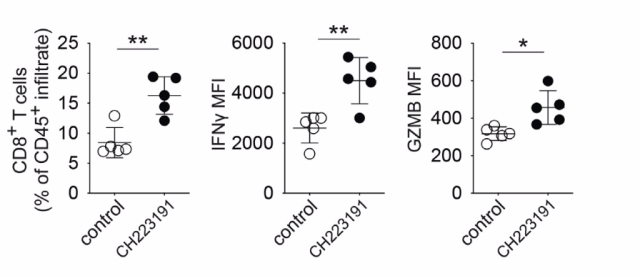
- The results showed an increase in CD8 + T cell infiltration.
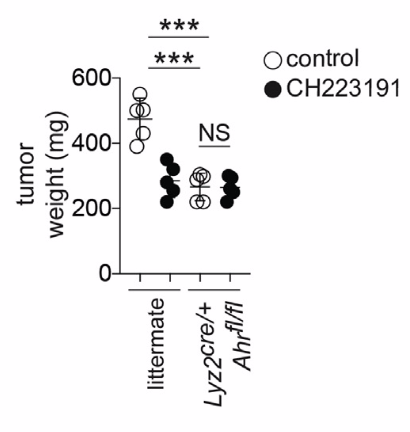
- Tumor weight decreased.
3. Lactic acid bacteria can promote tumorigenesis by producing indole and its related products indole-3-aldehyde (IAld) and indole lactic acid (ILA) combined with AhR.
By studying four kinds of lactic acid bacteria in mice, L.murinus, L.reuteri, L.johnsonni, L.intestinal, L.murinus, L.reuteri can generate IAlD and ILA far stronger than L.johnsonni, L.intestinal .
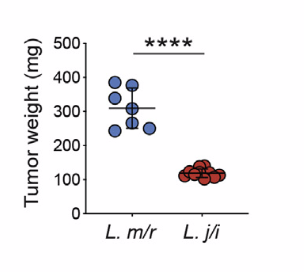
Compared with L.johnsonni and L.intestinal, L.murinus and L.reuteri can better promote tumor growth, which indirectly indicates that indole and its metabolites are the main substances
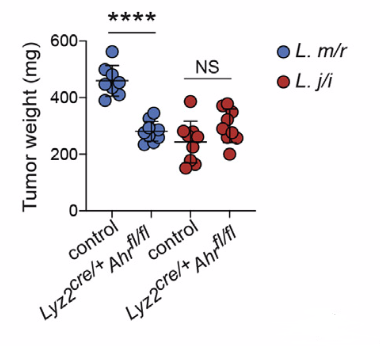
By repeating the experiment in AhR knockout mice, L. murinus and L. reuteri have decreased tumor-promoting ability in AhR knockout mice compared with the control group, indicating that lactic acid bacteria can bind AhR by producing indole and its related products thereby promoting tumor growth.
4. Tryptophan and dietary indole and its related products promote immunosuppression and pancreatic tumor growth .
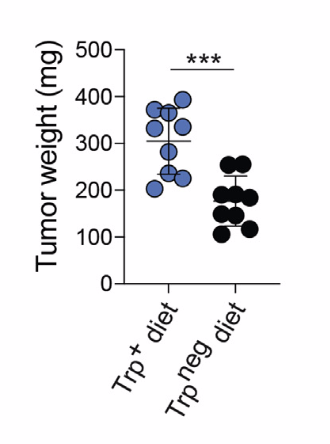
Compared with the diet supplemented with tryptophan, the tumor growth of mice in the group without tryptophan was significantly suppressed.
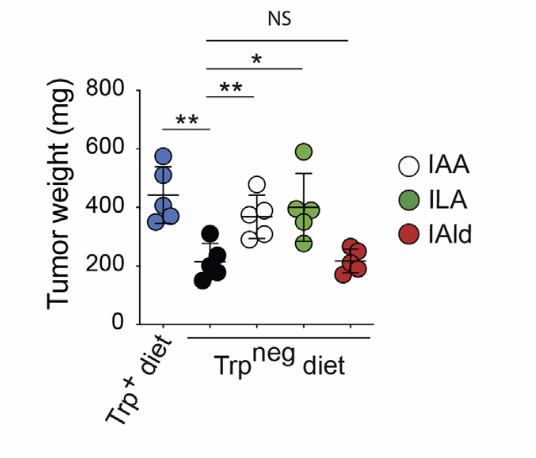
The anti-tumor effect of the group without tryptophan can be reversed by adding indole-3-acetic acid (IAA), ILA, IIAd and other indole-related products to the food, which proves that tryptophan is metabolized to generate indole-related products. effect.
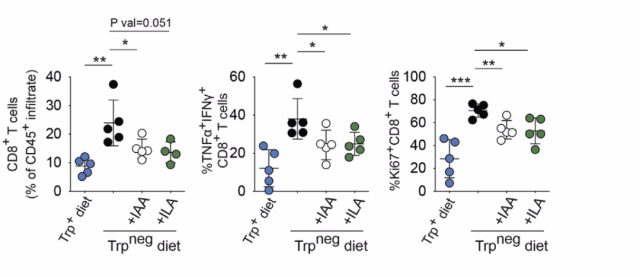
The infiltration and activity of CD8 + T cells were also significantly up-regulated in the group without tryptophan supplementation.
The above experiments indicate that the AhR-binding ligand indole and its related products of macrophages can promote the polarization of macrophages to the anti-inflammatory direction, thereby inhibiting the infiltration of CD8 + T cells, creating a microenvironment suitable for the survival of pancreatic cancer cells, and promoting the development of pancreatic cancer cells. cancer development.
Therefore, indole in food is crucial to the occurrence and development of pancreatic cancer, and tryptophan as its raw material is the culprit behind all this!
Can dietary modification suppress tumorigenesis?
The literature shows that many bacterial groups of the genera Bacteroides, Bifidobacterium, Clostridium and Lactobacillus are major producers of indole substances, and it is difficult for us to significantly change the intestinal bacteria in our body except by using antibiotics. proportion of the group.
A more feasible way is to perform fecal transplantation, thereby reducing the relative content of the above strains and reducing the production of indole.
Then some friends will ask, can we still drink yogurt?
We know that yogurt contains many probiotics, including lactic acid bacteria.
However, this article is based on the analysis of the intestinal flora of mice.
In mice, lactic acid bacteria are the main microorganisms that produce indole, and they are not necessarily applicable to humans!
Moreover, the article did not do relevant experiments on whether adding Lactobacillus can increase the risk of pancreatic cancer, and there is not enough experimental evidence to support the view that we cannot drink yogurt.
And studies have shown that oral probiotics can improve the homeostasis of intestinal flora in cancer patients and enhance the patient’s immunotherapy response, prolonging the patient’s survival!
references:
[1]Dizman N, Meza L, Bergerot P, Alcantara M, Dorff T, Lyou Y, Frankel P, Cui Y, Mira V, Llamas M, Hsu J, Zengin Z, Salgia N, Salgia S, Malhotra J, Chawla N , Chehrazi-Raffle A, Muddasani R, Gillece J, Reining L, Trent J, Takahashi M, Oka K, Higashi S, Kortylewski M, Highlander SK, Pal SK. Nivolumab plus ipilimumab with or without live bacterial supplementation in metastatic renal cell carcinoma : a randomized phase 1 trial. Nat Med. 2022 Feb 28. doi: 10.1038/s41591-022-01694-6. Epub ahead of print. PMID: 35228755.
2. After using the AhR antagonist CH223191, it was found that TAMs were also polarized in a pro-inflammatory direction, CD8+T infiltration increased, and tumor weight decreased.
(source:internet, reference only)
Disclaimer of medicaltrend.org
Important Note: The information provided is for informational purposes only and should not be considered as medical advice.



